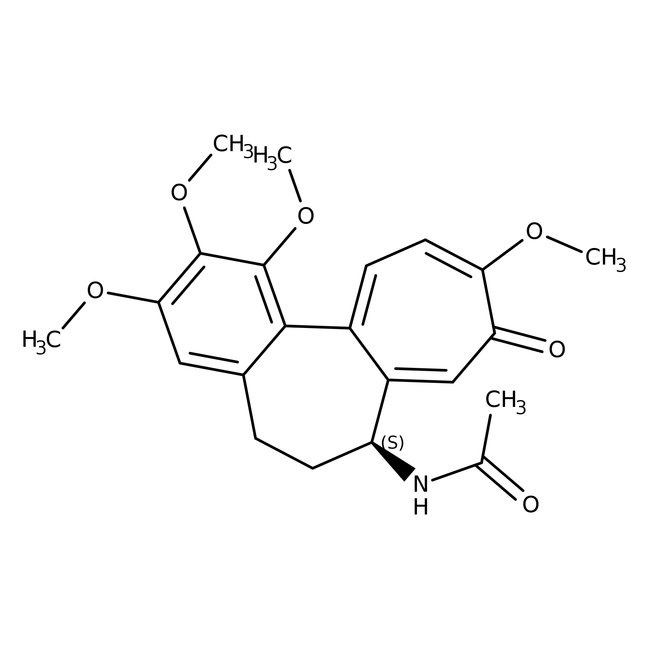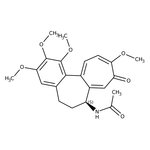Search Thermo Fisher Scientific
Thermo Scientific Chemicals
Colchicine, 98%
Microtubule disrupting agent, and induces apoptosis in human lymphoma cells | CAS: 64-86-8 | C22H25NO6 | 399.44 g/mol
| Catalog Number | Quantity |
|---|---|
| ALFJ61072.03 | 1 g |
Catalog number ALFJ61072.03
View Price:Sign InSign in to see your account pricing. Need an account? Register with us today.
Quantity:
1 g
Specifications
Chemical Name or MaterialColchicine
CAS64-86-8
Health Hazard 1H300-H340
Health Hazard 2GHS H Statement
H300-H340
Fatal if swallowed.
May cause genetic defects.
H300-H340
Fatal if swallowed.
May cause genetic defects.
Health Hazard 3P201-P202-P264b-P270-P281-P301+P310-P308+P313-P330-P501c
View more
Colchicine is most commonly used to treat gout. It is an inhibitor of microtubule polymerization which blocks chromosome segregation during meiosis. Consequently, it is used to induce polyploidy (tetraploid) in plant cells. It is an antimitotic agent that disrupts microtubules by binding to tubulin and preventing its polymerization. Stimulates the intrinsic GTPase activity of tubulin. Induces apoptosis in several normal and tumor cell lines and activates the JNK/SAPK signaling pathway.
This Thermo Scientific Chemicals brand product was originally part of the Alfa Aesar product portfolio. Some documentation and label information may refer to the legacy brand. The original Alfa Aesar product / item code or SKU reference has not changed as a part of the brand transition to Thermo Scientific Chemicals.
Applications
Colchicine is most commonly used to treat gout. It is an inhibitor of microtubule polymerization which blocks chromosome segregation during meiosis. Consequently, it is used to induce polyploidy (tetraploid) in plant cells. It is an antimitotic agent that disrupts microtubules by binding to tubulin and preventing its polymerization. Stimulates the intrinsic GTPase activity of tubulin. Induces apoptosis in several normal and tumor cell lines and activates the JNK/SAPK signaling pathway.
Solubility
Soluble in ethanol (10 mg/ml), water (45 g/L), chloroform, DMSO and methanol.
Notes
Light sensitive. Incompatible with oxidizing agents.
Colchicine is most commonly used to treat gout. It is an inhibitor of microtubule polymerization which blocks chromosome segregation during meiosis. Consequently, it is used to induce polyploidy (tetraploid) in plant cells. It is an antimitotic agent that disrupts microtubules by binding to tubulin and preventing its polymerization. Stimulates the intrinsic GTPase activity of tubulin. Induces apoptosis in several normal and tumor cell lines and activates the JNK/SAPK signaling pathway.
Solubility
Soluble in ethanol (10 mg/ml), water (45 g/L), chloroform, DMSO and methanol.
Notes
Light sensitive. Incompatible with oxidizing agents.
RUO – Research Use Only
General References:
- A.D.Caperta; M.Delgado; F.Ressurreicao; A.Meister; R.N.Jones; W.Viegas; A.Houben. Colchicine-induced polyploidization depends on tubulin polymerization in c-metaphase cells. Protoplasma. 2006, 227,(2-4), 147-153.
- A.B.Mendes-Bonato; M.Ferrari Felismino; A.M.Souza Kaneshima; C.Pessim; V.Calisto; M.Suely Pagliarini; C.Borges do Valle. Abnormal meiosis in tetraploid genotypes of Brachiaria brizantha (Poaceae) induced by colchicine: its implications for breeding. Journal of Applied Genetics. 2009, 50,(2), 83-87.



